Not long after I returned home to Seattle from my sneakbox adventure, one of the local television stations invited me to be a guest on their morning show to share my story and a few slides. There were two other guests on with me: a top-notch stunt and acrobatic pilot (a woman whose name escapes me now, we’ll call her Ann) and Susan Butcher, a dog-sled musher who had competed seven times in the grueling 938-mile Iditarod sled-dog race in Alaska. Shortly after the red ON AIR sign lit up, I was surprised when the hosts of the program introduced the three of us as “Risk-Takers,” and from the knit brows I saw on Ann and Susan, I think that they were also taken aback. We each took a turn to talk and share a slide presentation; I showed several of the images that have been featured in the three installments of my sneakbox story here in Small Boats. When we were asked about the risks we took, all of us agreed that the risks in our avocations were less than those we had taken in driving to the TV studio. Susan and Ann had put years into training and studying for the pursuits they chose and everything they did was tempered by experience.
Building on what I had picked up as a kid while backpacking and sailing with my father, I took an interest in wilderness skills and solo adventuring at the age of 17. What drove me was a nagging realization that I didn’t know how I’d fare on my own, dealing not only with the practical challenges, but also with the psychological ones. On my bicycle tour from Seattle to Los Angeles and back, I met a businessman on a sidewalk in downtown Portland, Oregon, who took an interest in my panier-burdened road bike. He asked where I slept at night, and I replied with just about anywhere I found to make camp at the end of the day. When I answered “Yes” to his question “Alone?” he said, “I think I’d go crazy on the first night.”
That was a fear that I had to a much lesser degree on the first night of my first backpacking solo, when I listened to things outside the tent that went bump in the night as if they were escaped convicts instead of nocturnal critters just out for a bite to eat. I didn’t want to carry fears like that: Would I panic in an emergency? Would I fail to solve problems quickly? Would I give up in the face of adversity? Would I not enjoy my own company? Whatever fears I might discover in myself, I thought I could grow out of them through solo adventuring in the wilderness.
When I was 18, I did my first solo backpack outing, in the summer and on a trail I’d hiked twice with my father, and in the years that followed I pushed the envelope until I was ready to undertake a solo winter hike on snowshoes with a heavy pack and to make an igloo for my shelter. When I switched to boating, I started with a summer cruise from familiar local waters and increased the distance and challenges for cruises that followed, culminating with my winter sneakbox cruise.
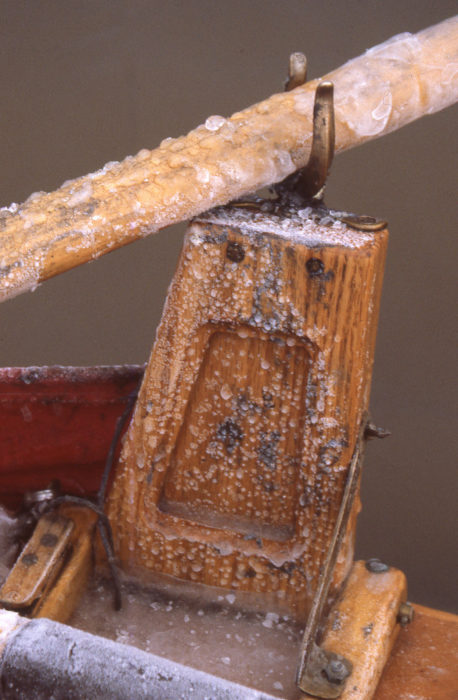
The morning after my night row, the sneakbox was still sheathed in ice from the spray that came over the bow. A dusting of frost (coating the oar leather, bottom left) settled on everything overnight.
During that 2,400-mile cruise, there was only one real risk that I took. It was on the day I left Memphis and chose to pass by several good camping spots while I still had daylight, and try to rendezvous with a friend who had offered me a hot meal and place to spend the night. I risked my wellbeing by attempting something that had nothing to do with the circumstances on the river. As a result, I got myself into real trouble trying to find a place to come ashore on a swift river, in the dark, in subfreezing temperatures that put me on the brink of hypothermia. You can read about it in the second installment of the cruise.
To help myself survive that night, I drew on an important experience from the year after I graduated from college. While visiting my sweetheart in Cambridge, Massachusetts, I strolled around town on Christmas Eve while waiting for her to get out of work. The streets were slushy, I was not wearing waterproof boots to keep my feet dry and warm, and I hadn’t had much to eat that day. Close to the time she got off work I waited outside the door leaning up against a cold brick wall. By the time she met me, I was slipping into hypothermia. The bad decisions I’d made had left me unnecessarily exposed to the cold. My arms and legs were numb, and the deep chill was closing in on my core. As we walked down the stairs to the subway station for the ride home, I doubled over with an abdominal spasm and started to sob. Fortunately, we were already in the comparatively warm air in the underground station and I started to recover.
That cold night on the Mississippi, I recognized what was happening to me and had a good idea of how long I would be able to function well enough to get off the river and get warm again. And I knew that I couldn’t afford to let my mind start slipping away, so I kept myself intensely focused on what I needed to do and fear never entered my mind.
Aside from that one lapse of good judgment during the 2-1⁄2 months I was cruising LUNA, I kept myself not just safe but happy by not taking risks. To be sure, there were plenty of times that I endured discomfort, especially on the relentlessly cold days and nights on the Ohio River; it was not risk-taking but rather an anticipated and essential part of the experience; I loved working my way out of it. Being warm, dry, clean, and well fed can now easily go without notice at home, but during my small-boat cruise in winter they were achievements that could even make me giddy with the pleasure of them. And all the people who took pity on me in my tiny boat and said I should have a motor missed how free and how powerful I felt rowing LUNA. They might be able to cover a distance in an hour that would take me from dawn to dusk, but I would see, hear, and experience much more and be all the richer, happier, and prouder for it.
When I was captivated in my late 20s by Nathaniel Bishop’s Four Months in a Sneak-Box, the real risk would have been to let the dreams it inspired pass and to enter adulthood without following in his wake, finding the answers to questions I had about myself, and discovering and enjoying what I was capable of as a human being.![]()

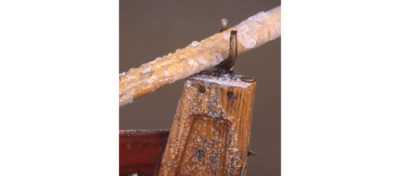



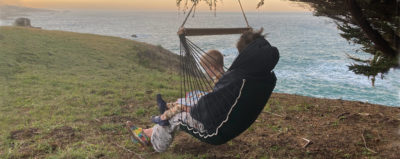

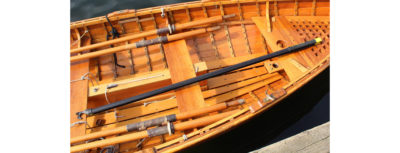


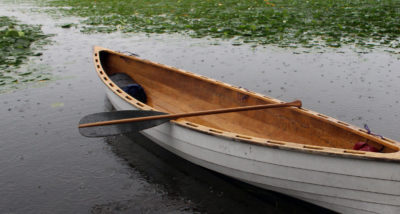
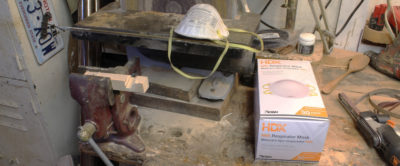
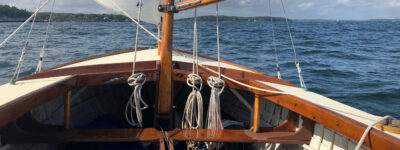
I very much agree with the statement: “the real risk would have been to let the dreams it inspired pass and to enter adulthood without following in his wake”. I am 76 years old and am still married to the woman I love, working at a job I enjoy, and exploring Narragansett Bay with family and friends in a boat that I built when 65. All of those things required evaluating and taking risks.
In my early 20s, as an Army officer in the rice paddies of the Mekong Delta, circumstances compelled me to formulate a strategy for dealing with risk. Risk was unavoidable and had to be managed effectively. It was easy to see that goals, not fears, were the more effective drivers of decision making.
Excess fear and caution are paralyzing and multiply risk. Siezing the initiative and managing fear-enducing risk with knowledge and preparation diminish actual risk.
Missing out on living by avoiding reasonable risk is a tragic waste of that life.
Beautifully written, Chris. Thanks
I generally prepare for my wilderness excursions. But preparation goes only so far. The un-expected has its own ideas of what will happen. No one goes out to die. But facing a threatening situation and being able to dig deep to endure it is a high reward for living one’s life. I really enjoy reading about others who reach out beyond the comforts of home. Every adventure they have is different from my own but all contain that last-day feeling of accomplishment.
“Susan Butcher, a dog-sled musher who had competed seven times in the grueling 138-mile Iditarod sled-dog race in Alaska.”
938 miles!
Right your are! My apologies for the typo. I’ve made the correction.
—Ed.
As the risk, real or perceived, grows, the senses sharpen and we take notice of the small details we ignore when all is well. That totally-in-the-moment situational awareness is the reward, one you’ve won so many times over. Thanks for the long piece, Chris. And for continuing well beyond Sea Kayaker.
GREAT JOB! You still got it…
Thanks for this and the Sneakbox articles. I grew up in New Orleans and was fortunate enough to sail in the lake and canoe/kayak in the bayous with my dad and go fishing in the marshes with my grandpa. Will definitely try to inspire this adventure in my kids. Thanks!